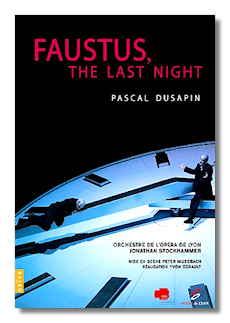
The Internet's Premier Classical Music Source
Related Links
- Latest Reviews
- More Reviews
-
By Composer
-
Collections
DVD & Blu-ray
Books
Concert Reviews
Articles/Interviews
Software
Audio
Search Amazon
Recommended Links
Site News
 DVD Review
DVD Review
Pascal Dusapin

Faustus, the Last Night
- Georg Nigl (Faustus)
- Urban Malmberg (Mephistopheles)
- Robert Wörle (Sly)
- Jaco Huijpen (Togod)
- Caroline Stein (The Angel)
Orchestre de l'Opéra de Lyon/Jonathan Stockhammer
Naïve MO 782177 DVD 104 minutes Anamorphic Widescreen Dolby Digital
Many composers have been inspired by the legend of Faust, the philosopher who sold his soul to the devil for a little love and learning. Pascal Dusapin's idiosyncratic take on the legend has less to do with Goethe (and even less to do with Gounod!) and more to do with Samuel Beckett. Indeed, Dusapin's opera takes place in a sort of endgame – a time outside of time – in which Faust (here called Faustus) has reached the end of the line, and has become not a pathetic creature but an annoying one. Even Mephistopheles, who is the more likeable of the two, appears put off by Faustus' endless grasping after "Light" (a metaphor for power and other desirables), his gloating, and his unanswerable questions.
Dusapin took his texts from Christopher Marlowe's version of Faust, and then mixed in bits of Shakespeare, Melville, Beckett, the Bible, and others. (He compares the brief quotations to the "cut-ups" of William S. Burroughs.) There is no plot per se, but Dusapin's text, in addition to being allusive, is highly emotional. This is the sort of drama that repays repeated viewings and listenings, not least because of Dusapin's intentional ambiguities. Several visual symbols are worth mentioning. First, the action is set on a giant raked clock face, complete with (erratically) moving hands. At one point a kitchen mixer is brought out and turned on. (It's a perfect metaphor for the simultaneous movement of planets on their axis and around the sun.) Near the end, a white balloon (the soul?) rises out of a grave-like depression in the clock into which Faustus has sunk, only to be burst by Togod. There's also a scene in which Mephistopheles and Togod ("To God," get it?) appear in white rabbit suits. (I admit that last symbol has me puzzled, but I kept thinking of Donnie Darko.)
Don't expect tuneful arias and duets. Dusapin is a modernist through and through, and he has created a score in which blocks, sheets, and filaments of pitched sound are interwoven or hurled together. If you submit yourself to it, it's rather beautiful, albeit in a jaw-clenching sort of way. What matters is that the composer's score is as emotional and as post-apocalyptic as the text that he has assembled.
This DVD was filmed live in March 2006 at the Opéra de Lyon in France – the première production, I assume. Everything about the performance and the way that it has been presented on DVD is perfect, from my perspective. Georg Nigl makes a fine anti-Heldentenor, if you will, in the title role, and baritone Urban Malmberg (dressed almost identically) is a chilling, tortured Mephistopheles. In the role of an ineffectual Angel, Caroline Stein spits and screams out a stream of off-coloratura, even if she (at first, anyway) is costumed as if she were Papagena with the mange. The simian blob in which Robert Wörle's Sly is costumed does nothing to prevent him creating a sympathetic character – a bit of comic relief, really – or from singing with divine innocence mingled with a human lust for life. Bringing up the group is Jaco Huijpen's implacable Togod, who casts a final chill on the proceedings when he reveals the secret of life to Faustus: there is nothing. American conductor Jonathan Stockhammer conducts Dusapin's score as if it were Mozart, so clean and precise are its contours.
The opera is complemented by 13 minutes of bonus interviews with the composer, the conductor, and Nigl. Watching this material before watching the opera probably is good preparation for what is to come. Either that, or read the excellent booklet that Naïve has supplied. The label also has supplied state-of-the-art sound (Dolby digital stereo) and image (16:9 anamorphic) for this production.
This is not the easiest opera ever to be written, but it's hard not to get swept into the ambiguity, the strangeness, and (yes) the beauty of it all. Recommended!
Copyright © 2007, Raymond Tuttle




















